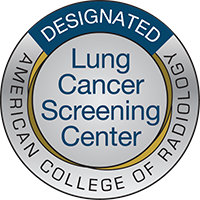Advanced Lung Care
Lung cancer is the leading cause of cancer death among both men and women in the United States, according to the Centers for Disease Control and Prevention. Each year, more people die of lung cancer than of colon, breast, and prostate cancers combined, according to the American Cancer Society (ACS).
One reason for the low survival rate is that lung cancer is often recognized in its later stages, when it is most difficult to treat and the course of action for patients is limited. The Comprehensive Lung Program at Wellington Regional Medical Center has a dedicated multi-disciplinary team of physicians and healthcare professions who work together to determine the best course of action for people who are diagnosed with lung cancer.
People who are at high risk for lung cancer can significantly improve their chances of surviving the disease if it is detected in its earliest stages. A low-dose-radiation computerized tomography (LDCT) scan may improve the survival rate through earlier detection, accurate diagnosis, accurate localization and curative therapy.
Request More Information
To get more information about the Comprehensive Lung Program, please complete and submit our contact form.
Designated Lung Cancer Screening Center
 Wellington Regional Medical Center has been designated a Lung Cancer Screening Center by the American College of Radiology (ACR). The ACR Lung Cancer Screening Center designation is a voluntary program that recognizes facilities that have committed to practice safe, effective diagnostic care for individuals at the highest risk for lung cancer.
Wellington Regional Medical Center has been designated a Lung Cancer Screening Center by the American College of Radiology (ACR). The ACR Lung Cancer Screening Center designation is a voluntary program that recognizes facilities that have committed to practice safe, effective diagnostic care for individuals at the highest risk for lung cancer.
Should You Have a Screening for Lung Cancer?
The Centers for Medicare and Medicaid Services lists the following criteria for screening:
-
If you are a current smoker or someone who quit smoking in the last 15 years and:
- Are 50-80 years old
- Have a 20 pack-year history of smoking (one pack a day for 20 years, two packs a day for 10 years, etc.)
Other factors your physician may consider include:
- Exposure to secondhand smoke
- Exposure to radon
- Exposure to workplace substances, including asbestos, arsenic, diesel exhaust, silica and chromium
- Family history
- Radiation therapy to the chest
- Diet
Our Clinical Navigator is Here To Help
Our Clinical Navigator offers you and your family personalized assistance from the moment you call or visit. The Clinical Navigator can schedule LDCT scans for patients, and helps guide patients and their families through healthcare decisions.
Contact Our Clinical Navigator
To contact the Clinical Navigator, please call 561-500-5864 (LUNG) or email at wrmclungprogram@uhsinc.com.
